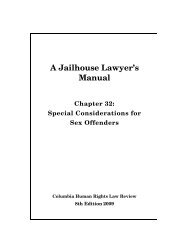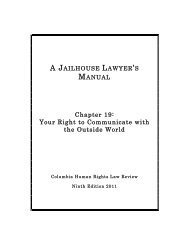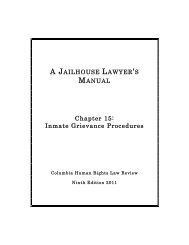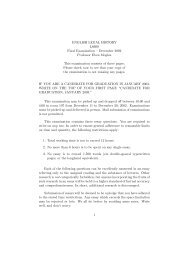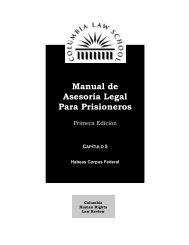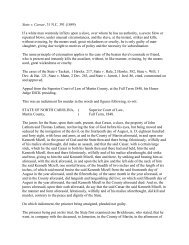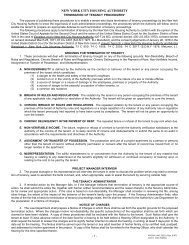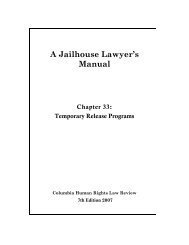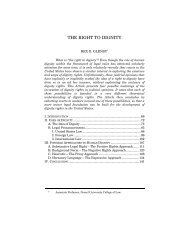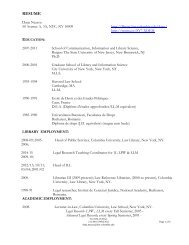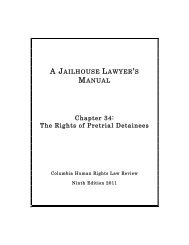A Right to Media? Lorie M. Graham - Columbia Law School
A Right to Media? Lorie M. Graham - Columbia Law School
A Right to Media? Lorie M. Graham - Columbia Law School
Create successful ePaper yourself
Turn your PDF publications into a flip-book with our unique Google optimized e-Paper software.
2010] A RIGHT TO MEDIA? 463<br />
UNDRIP. 130<br />
These important rights cannot be completely realized<br />
130. In relevant sections, UNDRIP states:<br />
Article 10<br />
Indigenous peoples shall not be forcibly removed from their<br />
lands or terri<strong>to</strong>ries. No relocation shall take place without the<br />
free, prior and informed consent of the indigenous peoples<br />
concerned and after agreement on just and fair compensation<br />
and, where possible, with the option of return.<br />
Article 11<br />
. . .<br />
2. States shall provide redress through effective mechanisms,<br />
which may include restitution, developed in conjunction with<br />
indigenous peoples, with respect <strong>to</strong> their cultural, intellectual,<br />
religious and spiritual property taken without their free, prior<br />
and informed consent or in violation of their laws, traditions<br />
and cus<strong>to</strong>ms.<br />
. . .<br />
Article 15<br />
. . .<br />
2. States shall take effective measures, in consultation and<br />
cooperation with the indigenous peoples concerned, <strong>to</strong> combat<br />
prejudice and eliminate discrimination and <strong>to</strong> promote<br />
<strong>to</strong>lerance, understanding and good relations among indigenous<br />
peoples and all other segments of society.<br />
. . .<br />
Article 17<br />
. . .<br />
2. States shall in consultation and cooperation with indigenous<br />
peoples take specific measures <strong>to</strong> protect indigenous children<br />
from economic exploitation and from performing any work that<br />
is likely <strong>to</strong> be hazardous or <strong>to</strong> interfere with the child’s<br />
education, or <strong>to</strong> be harmful <strong>to</strong> the child’s health or physical,<br />
mental, spiritual, moral or social development, taking in<strong>to</strong><br />
account their special vulnerability and the importance of<br />
education for their empowerment.<br />
. . .<br />
Article 19<br />
States shall consult and cooperate in good faith with the<br />
indigenous peoples concerned through their own representative<br />
institutions in order <strong>to</strong> obtain their free, prior and informed<br />
consent before adopting and implementing legislative or<br />
administrative measures that may affect them.<br />
. . .<br />
Article 28<br />
1. Indigenous peoples have the right <strong>to</strong> redress, by means that<br />
can include restitution or, when this is not possible, just, fair<br />
and equitable compensation, for the lands, terri<strong>to</strong>ries and<br />
resources which they have traditionally owned or otherwise<br />
occupied or used, and which have been confiscated, taken,



